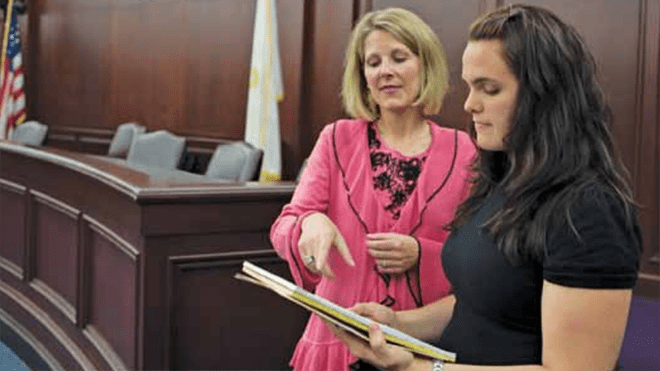RWU Professor Recognized for Career-Long Advocacy for Crime Victims
Professor of Legal Studies Tricia Martland ‘00L developed a passion for serving crime victims while earning her Juris Doctor degree, working as an advocate for victims of domestic violence at the Newport County District and Family Courts and the Providence District Court. Now, she trains her students to do the same.

RWU Professor of Legal Studies Tricia Martland ‘00L is devoted to improving education and access for victims of crime.
"The work doesn’t stop because the virus is here," she said. "The work continues. It is so important to make sure the people who need services know that there are people out there to help, and that they can make that connection."
Martland developed a passion for serving crime victims while earning her Juris Doctor degree at Roger Williams University School of Law, working as an advocate for victims of domestic violence at the Newport County District and Family Courts and the Providence District Court. Now, she trains her students to do the same.
As the director of the Legal Advocacy Clinic at the RWU School of Justice Studies, Martland brings students into courtrooms across Rhode Island to serve as advocates. She also trains members of the Rhode Island criminal justice system at the annual Rhode Island State Victim Assistance Academy, offered in partnership by RWU's Justice System Training and Research Institute and the Family Service of Rhode Island since 2008. Martland was involved in planning the educational curriculum for the launch of the Rhode Island State Victim Assistance Academy, and has taught at the conference ever since.
This summer, Martland was recognized for her career-long advocacy and efforts in the victims rights movement with a 2020 Crime Victim Service award at the first ever Virtual Crime Victim Service Awards Ceremony, presented by Family Service of Rhode Island and Rhode Island Attorney General Peter Neronha’s Office on behalf of the Rhode Island Crime Victim Service Provider Steering Committee.
We recently talked with Martland to learn more about the ways she serves victims of domestic violence and the providers who serve them.
Could you tell me about your work as an advocate for victims of crime?
I’ve been involved with the Rhode Island State Victim Assistance Academy, a yearly conference for individuals in the criminal justice system who work directly with victims. I played a large part in drafting the teaching components of the conference in its inaugural year. From that year on, I’ve taught the first day on navigating the legal system. We’ve been doing this for 12 years. We couldn’t do it in person this summer because of coronavirus, so we will do a virtual conference this fall. It’s been so rewarding and I’ve met so many incredible people.
What was it like to receive the award?
It was a huge honor. I was really grateful. The person who awarded it to me was a prosecutor at the department of the attorney general with me, Aaron Weisman. It was nice to see somebody who I knew personally talk about the award and its importance. I was really touched. It made me want to go back to work even harder.
How do you connect your advocacy work with your teaching?
Early on in my years at Roger Williams I developed a class known as the Legal Advocacy Clinic. I came up with this idea of having a course where I would teach the components of advocacy and bring the students to the courthouse as advocates. My students are in the classroom during the day, and in the last portion of the class they would go into the courthouses and work directly with victims of domestic violence. I’ve been doing this now for a good 12 or 13 years. I actually teach two sections every spring. We started off just with the Newport courthouse, but we have now expanded to cover almost every courthouse in Rhode Island. It’s really an amazing opportunity for the students.
Have you seen students bring their advocacy experience forward into their careers?
A number of my students have gone on to do advocacy work. I’ve had some go to different states and run their state’s advocacy centers. I had some go on to law school and do advocacy work as volunteers.
I had this really awesome student my very first year who I will never forget. He went on to be a police officer in Vermont with the state police, and he contacted me right after his police training. He told me he loved my course, but the police academy barely covered domestic violence. He asked me to send him my notes so he could share what he learned. I sent him a copy of my packet, and he held group sessions for the police force. He said that police officers needed to know how to work with victims in the community. I think about that and I think about all the work that is being done as the students move on.
Do you have favorite memories of your experience as an advocate?
It would be the rewarding feeling I feel at the end of the day. Demystifying the law is important. I do the same thing in the classroom with students. It is about taking concepts that might be difficult and putting them into layman’s terms so people feel confident enough to go out there and talk to a judge, ask questions, or say that something wasn’t done correctly. I have seen the people I’ve trained in the courtrooms doing that work, and I’ve seen them do this kind of work all over the state, and that has been a huge reward.